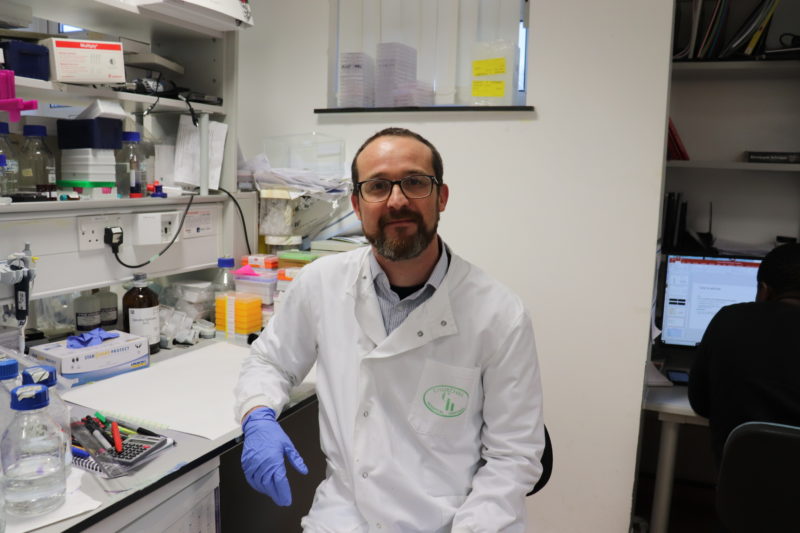- Posted: 09 April 2021
- Tagged: PCR News
Initial success leads to new award for Oxford researchers
In 2019 we awarded a pilot grant to Professor Bart Cornelissen and Dr Tiffany Chan at the University of Oxford to investigate if they could make a targeted radiotherapy treatment work in more men. Based on their achievements and the potential of their approach, we’ve made a further investment so they can continue their work.
PRESS RELEASE
Professor Bart Cornelissen and Dr Tiffany Chan, from the University of Oxford, have received an additional £408,338 award from the charity Prostate Cancer Research (PCR) to continue their innovative work to help a new type of radiotherapy, designed to hunt out cancer even after it has spread, to benefit even more men with prostate cancer. Prostate cancer is now the most commonly diagnosed cancer in the UK and their work could lead to more personalised treatment for those with prostate cancer.
Bart and Tiffany are working with a type of radionuclide therapy called 177Lu-PSMA. PSMA seeks out a protein found almost exclusively on prostate cancer cells, and by linking it to radioactive Lutetium (Lu), it can guide the radiotherapy directly inside tumour cells. ‘An advantage of 177Lu-PSMA is that we don’t need to know where all the cancer cells are before treatment, unlike in external beam radiotherapy’ explains Tiffany. ‘In theory, even if we just have a single cell that has split away from the main tumour, if it expresses PSMA, we should still be able to target it.’
Some Lu-PSMA treatments are already used in the UK, but on a private basis only and at the moment they are primarily used for pain relief. The Oxford researchers aim to combine Lu-PSMA with other therapies, and their initial results, from testing nearly 2,000 drugs, have led to the discovery of a group of drugs that may be able to help 177Lu-PSMA hunt out prostate cancer better and make it more effective for more patients. This discovery, which led to further funding from PCR for them to continue this exciting work, comes at an exciting time for radionuclide therapies. ‘There’s a very large Phase 3 clinical trial with Lu-PSMA and that seems to suggest that you actually get benefits in overall survival from this treatment’ explains Bart. ‘Rather than just being pain relief, we can now start to think of these as cures as well.’
“Speaking as a patient whose prostate cancer has been previously treated with radiotherapy and is likely to be so again in the future, I find this work to be a very welcome addition to the treatments available for the disease,’ said prostate cancer patient David Matheson. ‘It is heartening to see such progress with this treatment, and I look forward to it becoming more widespread in the future.’
During lockdown, the closure of their lab meant they had to find alternative ways to reach their goal. They found an innovative solution – reversing their original plans and developing new and efficient ways to analyse results in lockdown first, and then conducting the experiments when they could return to the lab. Tiffany developed a network analysis tool to enable them to predict which combinations might work. ‘I’m a Londoner, so I like to think of it like a tube map, where have all of our different tube stops, connected by different tube lines, with some lines being more efficient than others. The idea behind mapping the system in this way is that we can hopefully find the best line, or in this case, the best biological pathway, that is most likely to lead to synergism with Lu-PSMA,’ she said. PCR initially awarded £100,000 to Bart and Tiffany in 2019 to test up to 1,000 drugs in combination with 177Lu-PSMA. Despite the challenges brought on by the Covid-19 pandemic, the team surpassed their target and managed to test an incredible number of drugs.
Bart and Tiffany are hopeful that Lu-PSMA could become more widespread in the clinic but believe more research needs to be done. ‘Lu-PSMA is the new kid on the block, it’s a very new technology. I think there’s still a lack of understanding about how Lu-PSMA itself works, and there’s a lot of biology we can learn to improve its efficacy’ says Tiffany. ‘So that’s what we’re trying to achieve, particularly with our network analysis approach to map out the biology behind it.’
Quotes
“‘Bart and Tiffany’s project is already showing promising results on the route to improving radiotherapy for men with prostate cancer. We look forward to continuing to support their project on a larger and long-term basis and hope it will mean that more people can benefit from enhanced radiotherapy, without the side effects’
Dr Naomi Elster
Head of Research and Communications, PCR
“‘There are Lu-PSMA treatments that are already given in the UK but on a private basis’ Bart explains. ‘Whether that will hit the NHS depends on approval by NICE but given the fantastically positive data out there, the upcoming results of the VISION Phase 3 clinical trials that are very positive, and given the improvement in actual survival of patients, I think there is good hope there that that will be approved.’
Professor Bart Cornelissen
““Perhaps, what is most exciting is that, by targeting PSMA, this therapy delivers the radiotherapy directly to the sites of the cancer, wherever they are located. It is heartening to see such progress with this treatment, and I look forward to it becoming more widespread in the future.”
David Matheson
Prostate cancer patient
END
For further information, please contact:
Kath Coleman
Research Communications Assistant
[email protected]
Sign up for our latest news
